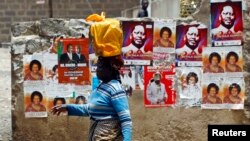NAIROBI —
Kenyans are voting to elect the country’s fourth president since independence. Police have issued warnings of possible violence during the poll.
Hours before the voting began Monday, police in the port city of Mombasa said an attack there killed several people, including police officers.
The two front-runners in Kenya’s presidential race are virtually tied for support according to recent public opinion polls.
Prime Minister Raila Odinga and his rival, Deputy Prime Minister Uhuru Kenyatta, have each predicted they will win in the first round. But if neither candidate gets more than 50 percent of the vote, a second round will be held in April.
In a message to the nation Friday, Kenya’s outgoing president, Mwai Kibaki, called for a peaceful vote and urged the candidates to accept the results - win or lose.
Kenyan police say they have reports of a possible threat. Police spokesman Charles Owino said some individuals may be planning to dress up in police uniforms and attack people in the Kibera and Mathare slums in Nairobi, and the city of Kisumu in western Kenya.
Owino says the police will use deadly force if necessary to contain any threats against the public.
“We are in charge of security in this country and therefore we have a responsibility to protect you. And we are not saying out of fear, we are saying when we have confidence, and warning them, because we do not want them to lose their lives unnecessarily.”
History of violence
The country is still healing from the violence that erupted following the disputed election in 2007, in which 1,100 people were killed and more than 600,000 were displaced.
Kenya’s electoral commission, the IEBC, has called on candidates to settle any disputes through legal channels.
IEBC chairman Ahmed Issack Haasan also said candidates should stop making accusations of vote rigging, which he said brings back bad memories of the last election.
“We as a commission have put in place a lot of efforts to ensure we’ve got officers, we have got systems that can ensure a credible and transparent election. We would like to urge these politicians and candidates to give the commission the opportunity to prove and make sure these elections are done peacefully.”
More than 14 million Kenyans have registered to vote in this year’s election.
The IEBC says they anticipate some logistical challenges during voting. Voters are casting ballots for several other elected positions aside from the president, including senators, women’s representatives and members of parliament.
The results will be counted at local tallying centers, and transmitted through a mobile-phone system to the national election center in Nairobi.
Hours before the voting began Monday, police in the port city of Mombasa said an attack there killed several people, including police officers.
The two front-runners in Kenya’s presidential race are virtually tied for support according to recent public opinion polls.
Prime Minister Raila Odinga and his rival, Deputy Prime Minister Uhuru Kenyatta, have each predicted they will win in the first round. But if neither candidate gets more than 50 percent of the vote, a second round will be held in April.
In a message to the nation Friday, Kenya’s outgoing president, Mwai Kibaki, called for a peaceful vote and urged the candidates to accept the results - win or lose.
Kenyan police say they have reports of a possible threat. Police spokesman Charles Owino said some individuals may be planning to dress up in police uniforms and attack people in the Kibera and Mathare slums in Nairobi, and the city of Kisumu in western Kenya.
Owino says the police will use deadly force if necessary to contain any threats against the public.
“We are in charge of security in this country and therefore we have a responsibility to protect you. And we are not saying out of fear, we are saying when we have confidence, and warning them, because we do not want them to lose their lives unnecessarily.”
History of violence
The country is still healing from the violence that erupted following the disputed election in 2007, in which 1,100 people were killed and more than 600,000 were displaced.
Kenya’s electoral commission, the IEBC, has called on candidates to settle any disputes through legal channels.
IEBC chairman Ahmed Issack Haasan also said candidates should stop making accusations of vote rigging, which he said brings back bad memories of the last election.
“We as a commission have put in place a lot of efforts to ensure we’ve got officers, we have got systems that can ensure a credible and transparent election. We would like to urge these politicians and candidates to give the commission the opportunity to prove and make sure these elections are done peacefully.”
More than 14 million Kenyans have registered to vote in this year’s election.
The IEBC says they anticipate some logistical challenges during voting. Voters are casting ballots for several other elected positions aside from the president, including senators, women’s representatives and members of parliament.
The results will be counted at local tallying centers, and transmitted through a mobile-phone system to the national election center in Nairobi.




